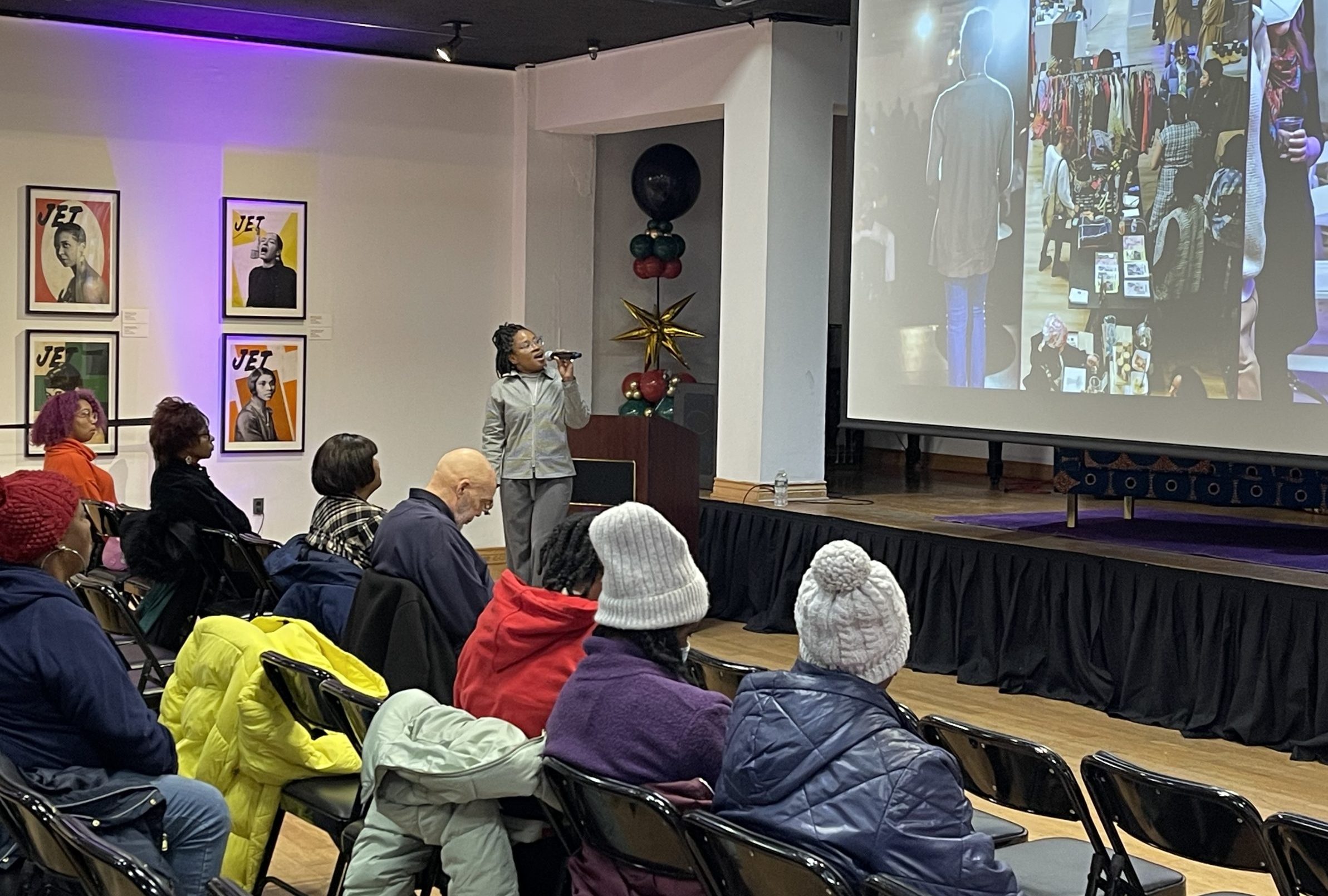
Debora Charmelus didn’t know it when she was growing up in Northeast Philly’s Oxford Circle neighborhood, but she now realizes that the whole time she was surrounded by entrepreneurs who would later inspire her own career.
“At the time, I just viewed it as hustles. You know, I knew the auntie who was selling platters. My dad would always learn construction skills, and, like, lend out his construction skills,” she recalled Friday.
“We as a community view that oftentimes as survival, but I view it as a mini-MBA, you know what I mean? I think it was imprinted on me,” she said.
Charmelus was speaking at a Kwanzaa event held at the African American Museum in Philadelphia. The discussion celebrated Kujichagulia, or self-determination, the principle associated with the second day of the seven-day holiday.
Along with regular visitors who came to see its galleries on Black history and culture, the museum invited middle school, high school and college students and their families to listen to the speakers, meet representatives from historically Black colleges and universities and other schools, and explore career pathways through interactive exhibits.
Careers centered on the Black community
Charmelus told an audience of about 25 people about her stumbles and successes as she built her career as a freelance cultural producer and event planner who has worked for Mural Arts, BlackStar Film Festival, and many other local nonprofits and arts institutions.

Among the most satisfying work she’s done recently is managing Black Music City’s grant program, which gives $5,000 directly to 30 Black artists. She also put together a Haitian Flag Day happy hour where she was able to mingle with fellow Haitian-Americans and push back against negative depictions that circulated during the presidential campaign.
“This was something we did to directly combat that narrative. It actually became a safe space for Haitian people to come in and feel relaxed, feel at ease, and meet other Haitian creatives in the community,” she said. “It was incredibly satisfying. I felt so proud to be able to create something that directly contributed to the well being of Haitians.”
Also speaking was Abu Edwards, the city’s director of Black male engagement. He answered questions about how he responds to professional challenges — “I go through hibernation, where it’s like, I open my laptop, I get my work, and I just start creating” — and the way his faith helped him through a rough patch when he was younger.
“When I thought that everything was done, and I knew that there couldn’t be a position that can unravel this, I saw God moving, because God was telling me that I would win — but he didn’t tell me when,” he said. “When I saw God’s hand moving, it told me that I have a place here on Earth. I’m here for a reason.”
Edwards’ account of serving as a leader and helper for other young Black people resonated with 19-year-old Nyvae Scott, a West Philly native who attends Hampton University in Virginia and aspires to be a real estate investor.
“I like that he said that when he’s around Black people he feels like he can relate, and he sees a bigger picture, as far as different opportunities that they might not see,” Scott said after the talk. “I think that’s really inspirational.”
Universal themes and celebrations
The Friday talks were among a host of activities taking place in Philadelphia to celebrate Kwanzaa, an annual celebration of African American culture that was created in 1966.
The Kwanzaa Cooperative organization held first-day celebrations with drumming and remarks at City Hall and Parkway Central Library on Thursday, and they were joined by city officials to mark the return of Kwanzaa lights on Boathouse Row. The lights were dark in 2023 because of a restoration project.
In honor of the principle of Umoja, or unity, the African American Museum held an opening unity celebration hosted by singer Shekhinah B. and lit the first candle on the Kinara, the traditional Kwanzaa candelabra.
The museum has additional events planned to match the principle of each day of Kwanzaa:
Day 3, Dec. 28: Ujima, collective work and responsibility. Writing workshop, poetry open mic. At the museum.
Day 4, Dec. 29: Ujamaa, cooperative economics. Black-owned business pop-up and quizzo at Franklin Square.
Day 5, Dec. 30: Nia, purpose. Kwanzaa-inspired cooking class at the Free Library’s Culinary Literacy Center.
Day 6, Dec. 31: Kuumba, creativity. Collage-making and family vision board. Online event.
Day 7, Jan. 1: Imani, faith. Activities and meditations to build community and family bonds. Online event.
The cooking program planned for Monday, Dec. 30 is a collaboration with Booker’s Restaurant, a southern eatery in West Philly, and has been one of the week’s highlights in past years, said Morgan Lloyd, the museum’s program coordinator.
She noted that while Kwanzaa draws from African and African American traditions, its themes are universal and it is celebrated in far-flung places across the world such as Japan.
“I encourage everyone just to come out and enjoy Kwanzaa, whether you identify as Black, as Philadelphian — it’s a celebration that really has wonderful roots, just to create principles to guide you into the next year,” she said.
Details of the events are available at the African American Museum website.
https://billypenn.com/wp-content/uploads/2024/12/IMG_5684-scaled-e1735339238623.jpeg
2024-12-27 16:43:02